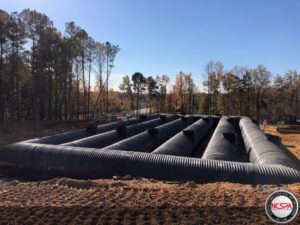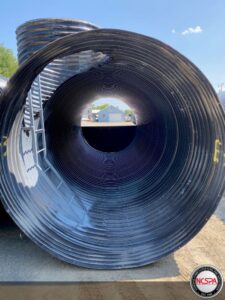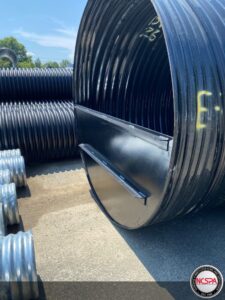By: Lane Enterprises, Inc

Carvana introduced its first iteration of a car vending machine in November 2013. By 2015, a fully automated, coin-operated version of the signature car vending machine opened in Nashville, Tennessee. In 2020, Carvana sold 244,111 vehicles and posted annual revenue of $5.587 billion, making it the second largest online used-car retailer in the US. As of August 2021, Carvana’s as-soon-as-next day delivery was available in 300+ markets across the country.
Carvana’s Chesterfield, VA 100-acre distribution site repairs, refurbishes, stores, and distributes used cars to these vending machines and supports direct shipments for online sales. To manage the demand the Chesterfield facility stores up to 7,000 automobiles.
VA DEQ stormwater storage requirements were met by directing runoff to a nearby floodplain with wet ponds and grass swales, but meeting water quality requirements for 81 acres of impervious area posed the greatest challenge since total phosphorous (TP) is the keystone pollutant to remove. To address phosphorous removal requirements in Virginia, various proprietary devices sanctioned by the DEQ are available.

However, phosphorous removal challenges for one of the larger drainage areas required a more classic, non-proprietary approach to reach the higher removal efficiencies needed for a limited treatment area with deep cover – the combination of which will always point towards large diameter CSP solutions. In this case, a 96-in diameter polymer coated CSP storage system with an integrated sand filter.
The Virginia Stormwater BMP Clearinghouse lists a number of proprietary filtering devices with TP removal efficiencies up to 50%. The only non-proprietary manufactured device is the underground sand filter topping the charts with a 60% TP removal efficiency.
 Reluctant at first, Chesterfield County was sold on learning the advancements made to CSP offerings over the years, especially the long service life afforded by the polymer coating and the ability to meet VA DEQ watertight performance requirements. Sand filters require a separate permanent pool chamber to settle solids and trap hydrocarbons, so the ability to meet watertight performance requirements allows the sand filter to function properly.
Reluctant at first, Chesterfield County was sold on learning the advancements made to CSP offerings over the years, especially the long service life afforded by the polymer coating and the ability to meet VA DEQ watertight performance requirements. Sand filters require a separate permanent pool chamber to settle solids and trap hydrocarbons, so the ability to meet watertight performance requirements allows the sand filter to function properly.